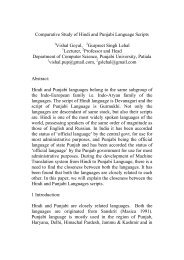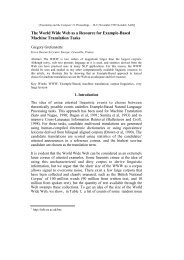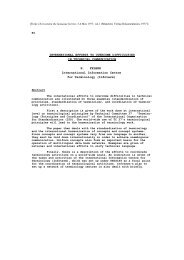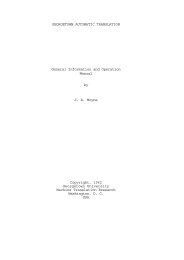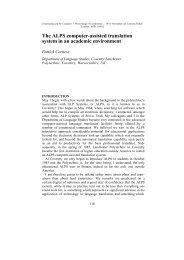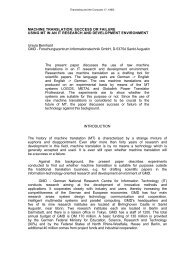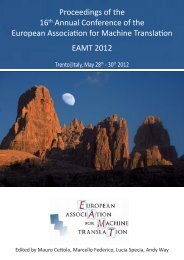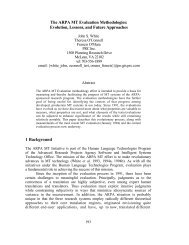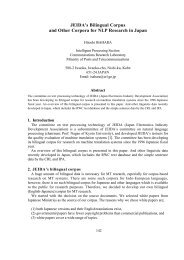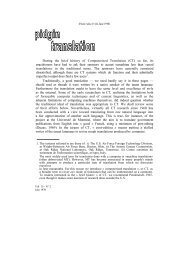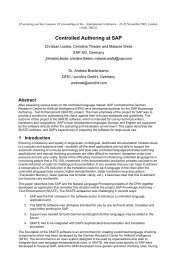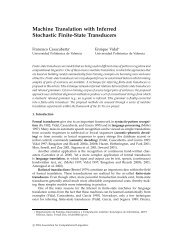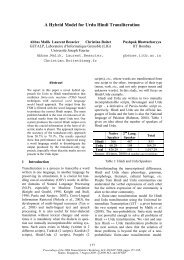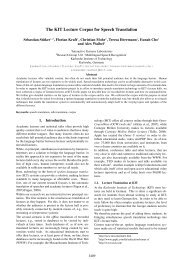MT News International no.18 - Machine Translation Archive
MT News International no.18 - Machine Translation Archive
MT News International no.18 - Machine Translation Archive
Create successful ePaper yourself
Turn your PDF publications into a flip-book with our unique Google optimized e-Paper software.
processing. The 58 papers (including the invited talks) covered many topics, techniques and<br />
applications - statistical tagging, word sense disambiguation, semantics, discourse,<br />
generation, machine translation, information extraction, text classification, language<br />
learning, lexicons, corpora, and tools. An introduction and overview of the state of the art on<br />
some of these topics were given by distinguished researchers at the summer school<br />
"Contemporary Topics in Computational Linguistics" which was held immediately before<br />
the conference (lecturers: Y.Wilks, S.Nirenburg, M.Zock, P.Seuren, T.McEnery, H.Trost,<br />
R.Mitkov, S.Sheremetyeva, M.Kudlek).<br />
The three days of the conference were hardly enough for the presentation of all<br />
papers (3 invited talks, 28 regular, 12 short, and 5 reserve papers) which necessitated the<br />
organisation of parallel sessions for all short papers. An evidence for the high rating of the<br />
event was the number of submissions (more than 160) and also the increased number of<br />
participants and authors - about 70 people from 24 countries (17% from Spain, 13% from<br />
Germany, 10% from USA, 8.5% from Japan and UK, etc.)The invited speakers touched on<br />
important issues and even two of them presented alternative approaches to the problem of<br />
word sense disambiguation: Y.Wilks talked about "Combining independent knowledge<br />
sources for word sense disambiguation"; S.Nirenburg argued how full ontological<br />
knowledge (Mikrokosmos) can be used for word sense disambiguation; P.Seuren presented<br />
"A discourse-semantic account of topic and comment".<br />
Many papers addressed various <strong>MT</strong>-related problems, e.g. word sense<br />
disambiguation (the two invited talks); semantic-based transfer (B.Wolf, M.Dorna, "Using<br />
hybrid methods and resources in semantic-based transfer"); information structure (P.Paggio<br />
"Information structure and <strong>MT</strong>: generating Danish existential sentences); shake-and-bake<br />
<strong>MT</strong> (D.Turcato et al "Inflectional information in transfer for lexicalist <strong>MT</strong>"); lexical<br />
ambiguity (B.Pedersen "Lexical ambiguity in <strong>MT</strong>: using frame semantics for expressing<br />
systemacies in polysemy"); example-based <strong>MT</strong> (T.Veale, A.Way "GAIJIN: a bootstrapping<br />
approach to example-based <strong>MT</strong>"); German-Russian <strong>MT</strong> (B.Staudinger, N.Smith "Aspect<br />
calculation in MIROSLAV: a German-Russian <strong>MT</strong> system"), and tools for building <strong>MT</strong><br />
systems - Episteme (J.Amores, J.Quesada "Efficiency and elegance in NLP: the EPISTEME<br />
approach") and Amalia (S.Wintner et al. "Amalia, a unified platform for parsing and<br />
generation").<br />
The majority of presented techniques were based on statistics and large corpora,<br />
which naturally resulted in an increased awareness for evaluation and efficiency. The<br />
implementation and testing of robust techniques based on a large-scale data seem to be<br />
gaining importance together with building re-usable language modules as needed for<br />
language engineering.<br />
Apart from the formal presentations, there were several additional demonstrations of<br />
the implemented systems (e.g., a system presented by David Turcato). The increased<br />
attention towards working NLP systems might necessitate the allocation of dedicated system<br />
demonstration slot in the programme of the next conference.<br />
The social calendar was also rich with events. It started with a traditional excursion<br />
to the old town of Plovdiv with its beautiful Renaissance architecture. In order to stimulate<br />
the contacts and informal discussions, the first day ended with a cocktail reception. The<br />
scenic area of the Batak lake was also a wonderful place to relax after the busy hours of the<br />
talks. The efficient organisation of transportation and accommodation before, during and<br />
after the conference, contributed to the pleasant stay of the attendees too.



